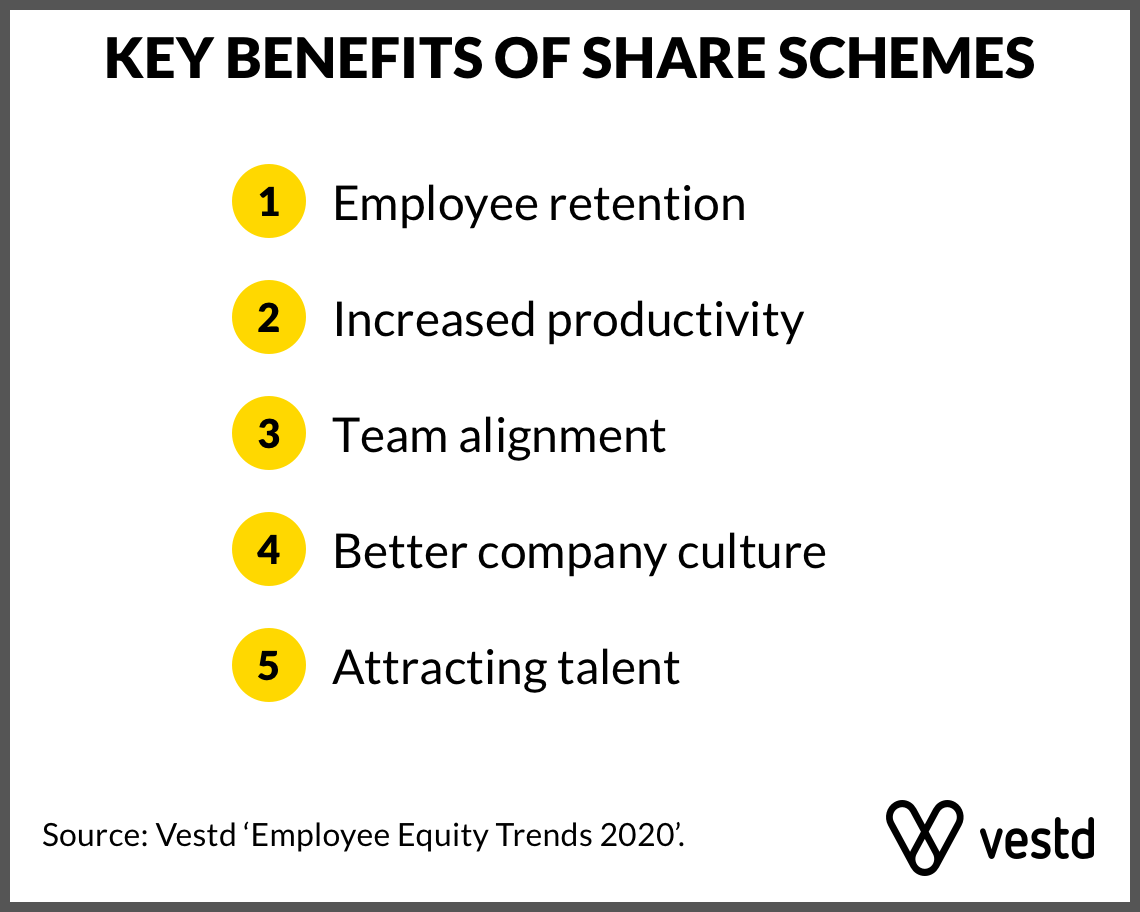
What’s the best type of employee share scheme for startups?
Many progressive startup founders choose to incentivise and reward their early hires with equity. The key benefits of a share scheme are that employees become more productive, more loyal, and more aligned with the company’s goals.
This helps increase the value of the company in the long run.

There are at least ten different ways of distributing equity, broadly grouped into two distinct camps: shares and options.
So which one is the best for a startup to use?
As ever that’s going to depend on all sorts of things, but ‘best’ implies safe, flexible, tax advantageous, affordable, and so on.
If we cut to the chase, the most cost effective and tax friendly way of sharing ownership for startups and SMEs is to launch an Enterprise Management Incentive (EMI) scheme.
Let’s explore what makes EMI option schemes so good for employers and employees.
Why are EMIs great for employers?
EMI schemes are an incredibly flexible way of rewarding your team with options, which give people the opportunity to buy shares down the line.
Options are subject to a vesting schedule. The employee needs to stay with the business for a set amount of time - usually four years - in order to unlock their full allocation of options. At that point they can be converted into real shares, based on a price established at the start of the agreement. The basic idea is that the company will be worth more in the future, so employees who receive options can effectively buy their shares at a discount.
An EMI options scheme is the most tax efficient of all, and also the most cost effective, to the point of not costing anything. Employers can offset both the cost of the scheme (as well as the tax benefits achieved by employees) against the company’s tax liability.
These HMRC-approved schemes have massive tax advantages, with employees benefiting from the lowest rate of Capital Gains Tax. Employees are eligible for Entrepreneurs’ Relief at the time of sale. This tax relief allows for a 10% Capital Gains Tax on any gains on the value of shares at the time of grant.
Certain conditions apply for the employee, who needs to wait at least 24 months from the date of the option grant before selling in order to benefit from the super low rate of CGT. They must also devote 75% of their working time to the company, or 25 hours per week.
Companies also need to meet some eligibility requirements for EMI schemes. They must have fewer than 250 employees, and gross assets must not exceed £30m at the time when the EMI options are granted. There is a campaign underway to increase these thresholds to make EMI schemes more inclusive for scaleups and larger SMEs.
At any rate, no other method of equity distribution comes close to EMI, in terms of the tax efficiency and affordability.
Flexible scheme design
The other great thing about EMIs is their flexibility. Many founders aren’t aware that you can add all sorts of conditions that govern the release of equity, when in fact they have plenty of scope to customise share schemes in all sorts of ways (so long as the right type of scheme is chosen).
EMI schemes - and Unapproved Options - are conditional by their very nature, as they are anchored around time-based vesting, but it is also possible to set other conditions such as performance goals and other milestones.
There is also a lot of flexibility with the vesting schedule. Most commonly we see startups setting a four-year vesting period, with a one-year cliff. Vesting can be done in a linear way, and released in same-sized chunks on a monthly or annual basis.
Vesting can also be backloaded. Some founders prefer to release larger proportions of equity as the employee nears the end of the vesting period. For example, 10% in year one, 20% in year two, 30% in year four and the remaining 40% in the fourth and final year. That kind of scheme design incentivises loyalty, although perhaps it doesn’t fully reward people in a proportionate manner.
When can employees turn their options into shares?
Founders can also determine when recipients of options can become actual shareholders. In the case of EMI schemes there is the vesting period to get through, but also the question of when to allow option holders to be able to buy their shares.
With this in mind, schemes can either be ‘exercisable’ or ‘exit-only’.
Exercisable schemes allow option holders to buy their shares at the end of the vesting period and / or key milestones (e.g. ‘reach or surpass your £1m sales target’). If the right provisions are in place they can also leave the business without forgoing their stake.
Exit-only schemes require a liquidity event of some kind (such as the sale of the company) before the shares can be bought. The irony here is that these people never really become actual shareholders - they merely sign over their shares to the new owner, and then cash out.
We are big fans of exercisable EMI schemes and monthly vesting, but it really is a case of horses for courses.
How to price your shares
HMRC will need to agree on a valuation for the business, which founders must provide to them. The process typically takes between two and four weeks from start to finish. Our valuation analysts take care of this for our customers as part of our service, or you could ask an accountant for help.
Once you have a valuation you can file it with HMRC. This has two major benefits: recipients of EMI options are confident of their value at the time of exercise, because they are backed by a written valuation by HMRC. It also provides some certainty regarding tax treatment going forward for both the business and employees, as long as all due criteria and processes are followed.
Who to reward with shares?
Some founders don’t launch a share scheme because they don’t want to give the whole team equity, but most scheme types allow them to pick and choose who gets a piece of the action.
Based on our research, about one in four SMEs in the UK will launch an inclusive share scheme for the entire team. However, EMI schemes are not company-wide by default: founders can choose who to reward, and the amount allocated will normally vary from person to person.
If you are a founder thinking about setting up a share scheme then you will need to answer three questions early on:
- How much of my company equity should I set aside for the scheme?
- How many shares should each team member receive?
- How do I manage dilution as new team members join the scheme?
Figuring out the answers to these questions will help you to establish a basic framework for sharing ownership.
How big should the option pool be?
The average amount of equity set aside is around 15-20%, though option pools can be bigger or smaller depending on the personal philosophies of the owners.
The other thing that determines how much of the company might find its way to employees is whether the company is raising serious capital or not. Most VCs insist that a company has an option scheme in place, which speaks volumes as to the effectiveness of incentivising employees with equity.
However, companies that are raising multiple VC rounds are more likely to have a limited option pool, and one that will be set in stone before the initial money comes in (so that the investors are not diluted).
How to manage your EMI scheme
Traditionally most people would look to their accountant for help in setting up a share scheme and HMRC filings, but a lot of the ongoing management normally takes place in-house by founders, CFOs or the HR team.
Nowadays there are a few digital platforms - such as Vestd - that you can use to minimise the effort and complexity of launching and managing a scheme.
Whatever you do, you must avoid using spreadsheets to track your ownership structure. It is all too easy to make the kind of mistakes in your cap table that can cost a fortune in unnecessary tax down the line. Broken cap tables will also damage trust between yourself and any prospective investors or acquirers, slamming the brakes on funding rounds or the sale of your business.
I hope this has given you some food for thought. Share schemes can be a wonderfully attractive way to incentivise employees (and non-employees, for that matter), and they do wonders for productivity, loyalty, cashflow and company culture.
Find out more
To learn more you can download our free guide: The Joy Of EMI Schemes. Should you use Vestd to set up your scheme then mention ‘Startups Magazine’ for a 10% first year discount.

